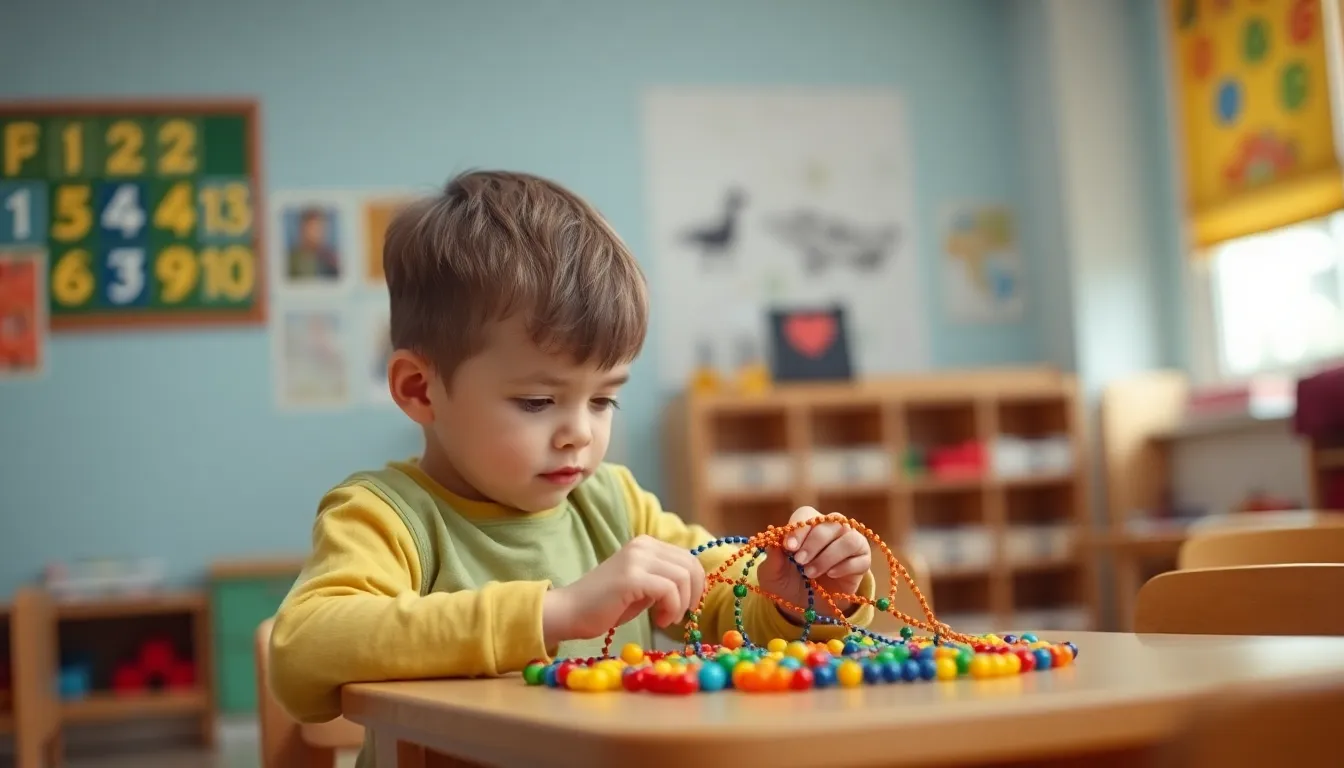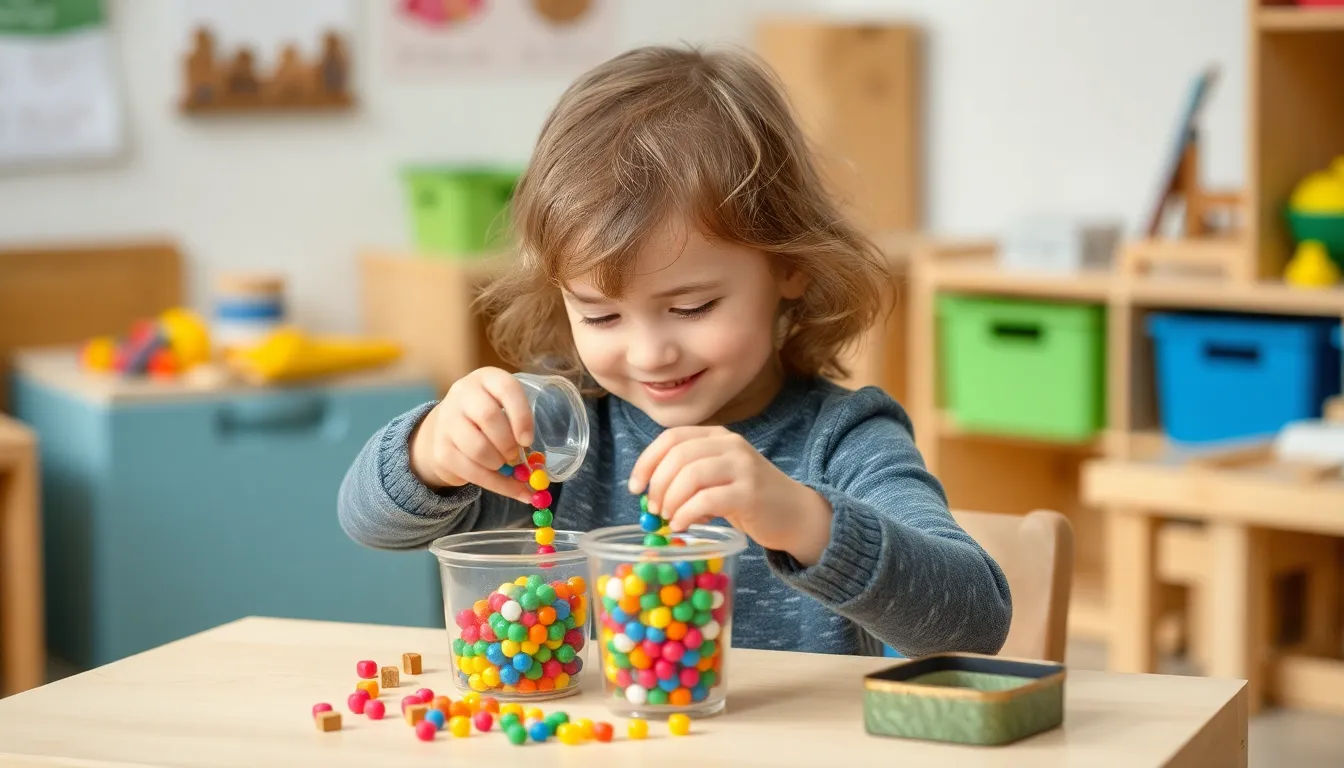In the world of education, Montessori fine motor skills are like the secret sauce that takes learning from bland to grand. These skills aren’t just about finger painting or building with blocks; they’re the building blocks of independence, creativity, and confidence. Imagine a child deftly stringing beads or zipping up their jacket while their peers are still wrestling with shoelaces—talk about a confidence boost!
Table of Contents
ToggleOverview of Montessori Fine Motor Skills
Montessori fine motor skills involve precise movements using small muscles in the hands and fingers. These skills form the foundation for various daily tasks, from writing to buttoning clothes. Through hands-on activities, children develop these essential skills while engaging in purposeful play.
Practical life exercises emphasize daily routines. Activities like pouring water or transferring rice enhance hand-eye coordination. Completing these tasks promotes independence and boosts self-confidence.
Art experiences also foster fine motor development. Activities such as cutting, gluing, or painting encourage creativity and dexterity. Engaging with different tools helps children refine their movements.
Manipulative toys play a crucial role in this development. Items like puzzles and building blocks require precision. Mastering these toys strengthens finger muscles and coordination.
Various materials offer unique benefits. Beads and laces improve dexterity and concentration when children string them together. Clay and dough allow for exploration, enhancing tactile sensitivity and grip.
Montessori environments are designed to support fine motor skills effectively. They provide accessible materials that encourage exploration and learning. Children choose activities at their own pace, reinforcing their natural motivation to learn.
Observing children during these activities reveals their progress. As they master skills, they gain a sense of accomplishment. This growth fosters a desire to try new challenges, further enhancing their development.
Importance of Fine Motor Skills in Early Development

Fine motor skills play a crucial role in a child’s early development. These skills support various aspects, including cognitive growth and emotional well-being.
Cognitive Development
Fine motor skills enhance cognitive development by facilitating problem-solving and critical thinking. Activities like manipulating small objects encourage children to think creatively and strategically. Engaging in tasks such as sorting beads or assembling puzzles strengthens neural connections, promoting brain development. With repetition, children improve their attention span and focus on detail. These fundamental skills create a foundation for academic tasks like writing and arithmetic. Furthermore, mastering fine motor tasks gives children confidence in their abilities, allowing them to approach new challenges with curiosity.
Emotional and Social Development
Children build emotional and social skills through fine motor activities. Mastering tasks provides a sense of accomplishment, boosting self-esteem and confidence. As they engage in group tasks like building with blocks, they learn to collaborate and communicate effectively with peers. Social interactions during play foster sharing and patience, essential traits for forming relationships. Children develop resilience as they navigate challenges, learning perseverance. Positive experiences with fine motor skills pave the way for emotional regulation, helping children express themselves positively.
Montessori Approach to Fine Motor Skills
The Montessori method prioritizes hands-on experiences that facilitate fine motor skill development in children. Engaging in purposeful play encourages exploration and independence.
Hands-On Learning Activities
Hands-on learning activities offer practical applications for developing fine motor skills. Activities such as pouring water or transferring rice require precision and coordination. Art experiences, including cutting paper and gluing materials, foster creativity while enhancing dexterity. Manipulative toys like puzzles also serve an important role, promoting problem-solving and hand strength. Children benefit from these activities as they see tangible results from their efforts.
Role of the Environment
The environment significantly influences the development of fine motor skills within a Montessori setting. Accessible materials invite children to explore at their own pace, creating opportunities for learning. Designated areas for activities, such as art stations or sensory tables, encourage engagement and focus. Well-organized spaces promote independence, enabling children to choose tasks that interest them. The supportive atmosphere fosters confidence, allowing them to tackle new challenges with ease.
Practical Applications in Montessori Classrooms
Montessori classrooms provide rich environments for developing fine motor skills through various effective activities. These practical applications enhance children’s dexterity and confidence.
Sensorial Materials
Sensorial materials serve a crucial role in fine motor skill development. Children engage with items like geometric solids and texture boards, promoting tactile exploration. These resources encourage various movements, such as grasping and stacking, which strengthen hand-eye coordination. Lacing cards and cylinders also enhance precision as children manipulate objects. By interacting with these materials, learners refine their sensory perceptions while developing essential skills that translate to tasks beyond the classroom.
Everyday Living Activities
Everyday living activities provide hands-on experiences that promote fine motor skills effectively. Tasks like pouring, spooning, and buttoning help children practice coordination. These activities make learning practical while instilling a sense of independence. Children learn to manage zippers and ties, which boosts their self-esteem as they master daily challenges. Engaging in these routines emphasizes the connection between fine motor skills and real-life applications, allowing children to thrive in both educational and social situations.
Benefits of Developing Fine Motor Skills
Developing fine motor skills offers numerous advantages in early childhood. Independence emerges as children learn to manage everyday tasks. For instance, mastering zipping jackets or buttoning shirts enhances their self-sufficiency. Confidence grows as they successfully complete these activities, often boosting self-esteem compared to peers.
Creativity flourishes through hands-on experiences. Engaging in art activities, such as cutting with scissors or gluing, allows artistic expression and fine control. Problem-solving abilities sharpen as children manipulate small objects, encouraging strategic thinking. Activities like building puzzles require focus and dexterity, promoting cognitive development.
Emotional well-being connects closely to fine motor skill development. Successful completion of tasks fosters a sense of accomplishment. Children navigate challenges collaboratively with peers, building relationships through shared experiences. Resilience strengthens when they encounter difficulties and persevere.
Physical skills also improve through regular practice. Activities involving pouring, scooping, or transferring materials enhance hand-eye coordination. Fine motor practices lay a foundation for future skills, including writing. Engaging with various materials—like beads, laces, and clay—offers tactile experiences that enhance grip strength and sensitivity.
Montessori environments specifically support these developmental benefits. Accessible materials invite exploration, making fine motor skill development engaging and enjoyable. Designated areas within the classroom enhance focus and encourage self-directed learning. As children embark on this journey, their progress becomes evident, encouraging them to take on new challenges with enthusiasm.
Montessori fine motor skills play a vital role in a child’s overall development. By engaging in hands-on activities, children not only enhance their dexterity but also boost their confidence and independence. The carefully designed Montessori environment fosters exploration and creativity, allowing children to master essential skills at their own pace.
As they navigate various tasks, children develop problem-solving abilities and emotional resilience. The benefits of fine motor skill development extend beyond the classroom, laying a strong foundation for future learning and self-sufficiency. Embracing these principles can significantly enrich a child’s educational experience, promoting a lifelong love for learning and growth.



